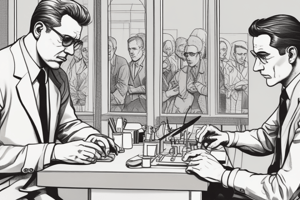Podcast
Questions and Answers
What was the predicted percentage of participants who would obey the experimenter and give the maximum level of shock in Milgram's experiment?
What was the predicted percentage of participants who would obey the experimenter and give the maximum level of shock in Milgram's experiment?
- Seventy-five percent
- Fifty percent
- Less than one percent (correct)
- Twenty percent
What factor lowered obedience in Milgram's experiment?
What factor lowered obedience in Milgram's experiment?
- Proximity to the learner (correct)
- Presence of obedient confederates
- Proximity to the experimenter
- Gender differences
What was the percentage of participants (teachers) who actually gave the maximum shock in Milgram's experiment?
What was the percentage of participants (teachers) who actually gave the maximum shock in Milgram's experiment?
- 90%
- 65% (correct)
- 20%
- 40%
What did the most recent replication of the Milgram experiment find?
What did the most recent replication of the Milgram experiment find?
What was the role of the learner in Milgram's experiment?
What was the role of the learner in Milgram's experiment?
What is the term for attributing behavior to internal characteristics or personal factors?
What is the term for attributing behavior to internal characteristics or personal factors?
Which bias involves underestimating situational factors and viewing behavior as a result of disposition, even when strong situational factors are obvious?
Which bias involves underestimating situational factors and viewing behavior as a result of disposition, even when strong situational factors are obvious?
What is the term for the tendency to use situational attributions to explain our own behavior while using dispositional attributions to explain the behavior of others?
What is the term for the tendency to use situational attributions to explain our own behavior while using dispositional attributions to explain the behavior of others?
What bias involves attributing success to dispositional factors while attributing failure to situational factors?
What bias involves attributing success to dispositional factors while attributing failure to situational factors?
Which term refers to the tendency to fail to consider situational factors altogether when attributing behavior?
Which term refers to the tendency to fail to consider situational factors altogether when attributing behavior?
Flashcards
Predicted Obedience in Milgram's Study
Predicted Obedience in Milgram's Study
Less than 1% of participants were predicted to obey and give the maximum shock.
Proximity's Effect on Obedience
Proximity's Effect on Obedience
Increased proximity of the teacher to the learner reduced obedience.
Actual Obedience Rate in Milgram's Experiment
Actual Obedience Rate in Milgram's Experiment
65% of participants administered the maximum shock level.
Replication Findings of Milgram's
Replication Findings of Milgram's
Signup and view all the flashcards
Role of the Learner in Milgram's Experiment
Role of the Learner in Milgram's Experiment
Signup and view all the flashcards
Dispositional Attribution
Dispositional Attribution
Signup and view all the flashcards
Correspondence Bias
Correspondence Bias
Signup and view all the flashcards
Actor-Observer Bias
Actor-Observer Bias
Signup and view all the flashcards
Self-Serving Bias
Self-Serving Bias
Signup and view all the flashcards
Fundamental Attribution Error
Fundamental Attribution Error
Signup and view all the flashcards
Study Notes
Milgram's Experiment
- Only 1.3% of participants were predicted to obey the experimenter and give the maximum level of shock.
- The presence of another person who refused to give shocks lowered obedience.
- In reality, 65% of participants (teachers) gave the maximum shock in the experiment.
Recent Replication and Learner's Role
- The most recent replication of the Milgram experiment found similar results, indicating that humans still have a strong tendency to obey authority.
- The learner in Milgram's experiment was an actor who pretended to receive electric shocks, with the goal of studying obedience to authority.
Attribution Biases
- The term for attributing behavior to internal characteristics or personal factors is called dispositional attribution.
- The fundamental attribution error involves underestimating situational factors and viewing behavior as a result of disposition, even when strong situational factors are obvious.
- The actor-observer bias refers to the tendency to use situational attributions to explain our own behavior while using dispositional attributions to explain the behavior of others.
- The self-serving bias involves attributing success to dispositional factors while attributing failure to situational factors.
- The oversight bias refers to the tendency to fail to consider situational factors altogether when attributing behavior.
Studying That Suits You
Use AI to generate personalized quizzes and flashcards to suit your learning preferences.




